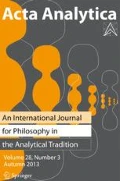Abstract
This paper starts with an examination of the major problems of foundation-oriented epistemology in Sect. 2. Then, in Sects. 3–4, it is argued that the externalistic re-definition of knowledge deprives this concept from useful applications to human’s epistemic practice. From the viewpoint of cultural evolution, the condition of justification is the most important ingredient of knowledge. An alternative foundation-oriented conception of knowledge called third-person internalism is developed in Sect. 2 and Sect. 5. It combines insights of externalism with the requirement of second-order justification. The application of third-person internalism to contextualistic positions leads to an important constraint on contextualism (Sect. 6). The final section (Sect. 7) sketches new prospects for a foundation-oriented epistemology which are based on epistemic optimality arguments.

Similar content being viewed by others
References
Alston, W. P. (1989). Epistemic justification. London: Ithaca.
Baumann, P. (2002). Erkenntnistheorie. Stuttgart: Metzler.
Beckermann, A. (2001). Zur Inkohärenz und Irrelevanz des Wissensbegriffs. Plädoyer für eine neue Agenda in der Erkenntnistheorie. Zeitschrift für Philosophische Forschung, 55, 571–593.
Brendel, E., & Jäger, C. (2004). Contextualist approaches to epistemology: problems and prospects. Erkenntnis, 61(2–3), 143–172.
BonJour, L. (1985). The structure of empirical knowledge. Harvard: Harvard Univ. Press.
Cohen, St. (1986). Knowledge and context. The Journal of Philosophy, 83, 574–583.
Conee, E., & Feldman, R. (2001). Internalism defended. In H. Kornblith (Ed.), Epistemology: Internalism and externalismM (pp. 231–260). Oxford: Blackwell.
Craig, E. (1990). Knowledge and the state of nature. An essay in conceptual synthesis. Oxford: Oxford Univ. Press.
Dancy, J. (1985). An introduction to contemporary epistemology. Oxford: B. Blackwell.
DeRose, K. (1995). Solving the skeptical problem. The Philosophical Review, 104, 1–52.
DeRose, K. (1999). Contextualism: an explanation and defense. In J. Greco & E. Sosa (Eds.), The Blackwell guide to epistemology (pp. 187–205). Oxford: B. Blackwell.
Dretske, F. (1970). Epistemic operators. The Journal of Philosophy, 67, 1007–1023.
Dretske, F. (1981). Knowledge and the flow of information. Oxford: B. Blackwell.
Dretske, F. (1991). Two conceptions of knowledge: rational vs. reliable belief. Grazer Philosophische Studien, 40, 15–30.
Fahrbach, L. (2004). Die Elimination des Wissensbegriffs. Facta Philosophica, 6, 45–56.
Gettier, E. L. (1963). Is justified true belief knowledge? Analysis, 23, 121–123.
Goldman, A. (1986). Epistemology and cognition. Cambridge/Mass.: Harvard Univ. Press.
Goldman, A. (1999). Knowledge in a social world. Oxford: Oxford Univ. Press.
Grundmann, T. (2001). Das erkenntnistheoretische Regressargument. Zeitschrift für Philosophische Forschung, 55, 221–245.
Lehrer, K. (1974). Knowledge. Oxford: Clarendon Press.
Lehrer, K. (1990). Theory of knowledge. London: Routledge.
Nozick, R. (1981). Philosophical explanations. Oxford: Oxford Univ. Press.
Salmon, W. C. (1957). Should we attempt to justify induction? Philosophical Studies, 8(3), 45–47.
Sartwell, C. (1992). Why knowledge is merely true belief. The Journal of Philosophy, 89, 167–180.
Schurz, G. (2001). What is ‘normal’? Philosophy of Science, 28, 476–497.
Schurz, G. (2007a). Coherentism, externalism and contextualism as forms of epistemological resignation. To appear in A. Beckermann et. al. (Eds.), Proceedings of GAP.6. Paderborn: Mentis.
Schurz, G. (2007b). Clash of civilizations? In C. Kanzian & E. Runggaldier (Eds.), Cultures. Conflict-Analysis-Diagnosis (pp.277–294). Frankfurt: Ontos.
Schurz, G. (2007c). Meta-Induction. A game-theoretical approach to the problem of induction. To appear in C. Glymour & D. Westerståhl & Wei Wang (Eds.), Proceedings from the 13th International Congress of Logic, Methodology and Philosophy. London: King’s College Publications.
Shogenji, T. (2007). Internalism and externalism in meliorative epistemology. Online-paper http://www.ric.edu/faculty/tshogenji/workprogress.htm.
Stroud, B. (1984). The significance of skepticism. Oxford: Oxford Univ. Press.
Triplett, T. (1990). Recent work on foundationalism. American Philosophical Quarterly, 27(2), 93–116.
Van Cleve, J. (1984). Reliability, justification, and induction. In P. A. French et al. (Eds.), Causation and causal theories (pp. 555–567). Midwest Studies in Philosophy 4.
Author information
Authors and Affiliations
Corresponding author
Rights and permissions
About this article
Cite this article
Schurz, G. Third-Person Internalism: A Critical Examination of Externalism and a Foundation-Oriented Alternative. Acta Anal 23, 9–28 (2008). https://doi.org/10.1007/s12136-008-0016-2
Received:
Accepted:
Published:
Issue Date:
DOI: https://doi.org/10.1007/s12136-008-0016-2


